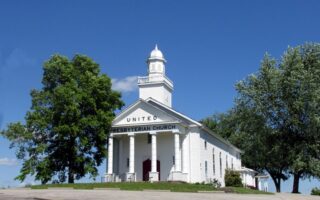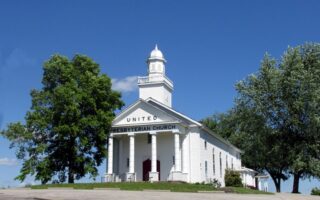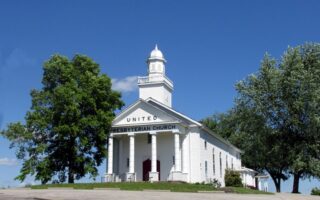The Free Presbyterian Church is a Christian denomination that originated in Scotland in the mid-20th century. It is known for its conservative beliefs and adherence to the principles of Calvinism. In this introduction, we will explore whether the Free Presbyterian Church can be considered Calvinist in its theological stance.
Table of Contents
The Origins and Beliefs of Free Presbyterian Calvinism
Is Free Presbyterian Calvinist?
When it comes to religious denominations, there are often many questions and misconceptions surrounding their beliefs and origins. One such denomination that has sparked curiosity is the Free Presbyterian Church. Many people wonder if the Free Presbyterian Church is Calvinist in its beliefs. To answer this question, we must delve into the origins and beliefs of Free Presbyterian Calvinism.
The Free Presbyterian Church traces its roots back to Scotland in the mid-20th century. It was founded by the influential Scottish minister, Ian Paisley, who sought to establish a church that adhered strictly to the principles of the Protestant Reformation. Paisley was a staunch defender of Calvinistic theology, which emphasizes the sovereignty of God and the doctrine of predestination.
Calvinism, named after the 16th-century theologian John Calvin, is a branch of Protestantism that places a strong emphasis on the sovereignty of God in salvation. It teaches that God has predestined certain individuals to be saved, while others are predestined to be damned. This belief is often referred to as the doctrine of election.
The Free Presbyterian Church fully embraces the Calvinistic doctrine of election. It believes that salvation is solely the work of God and that humans have no ability to save themselves. According to Free Presbyterian Calvinism, God chooses who will be saved and who will not, based solely on His sovereign will. This belief is central to the denomination’s understanding of salvation.
In addition to the doctrine of election, Free Presbyterian Calvinism also upholds other key tenets of Calvinistic theology. These include the total depravity of humanity, the irresistible grace of God, and the perseverance of the saints. The Free Presbyterian Church believes that humans are born sinful and incapable of doing anything to earn their salvation. It teaches that God’s grace is irresistible and that those whom He has chosen will inevitably be saved. Furthermore, it holds that true believers will persevere in their faith until the end, as a result of God’s preserving grace.
While the Free Presbyterian Church is undoubtedly Calvinistic in its beliefs, it is important to note that not all Presbyterians are Calvinists. Presbyterianism is a broad term that encompasses various branches and interpretations of the Christian faith. Some Presbyterian denominations may hold to different theological perspectives, such as Arminianism or a more moderate form of Calvinism.
In conclusion, the Free Presbyterian Church is indeed Calvinistic in its beliefs. It adheres to the principles of Calvinistic theology, including the doctrine of election, the total depravity of humanity, the irresistible grace of God, and the perseverance of the saints. Founded by Ian Paisley in Scotland, the Free Presbyterian Church sought to establish a church that strictly adhered to the principles of the Protestant Reformation. While not all Presbyterians are Calvinists, the Free Presbyterian Church stands firmly within the Calvinistic tradition. So, if you ever find yourself wondering if the Free Presbyterian Church is Calvinist, you can confidently answer, yes, it is.
Exploring the Doctrinal Differences Between Free Presbyterian Calvinism and Other Calvinist Denominations

Is Free Presbyterian Calvinist?
When it comes to understanding different denominations within Christianity, it can sometimes feel like navigating a maze. Theologies, doctrines, and beliefs can vary greatly, even among those who identify as Calvinists. One particular denomination that often sparks curiosity is the Free Presbyterian Church. Is it truly Calvinist? Let’s explore the doctrinal differences between Free Presbyterian Calvinism and other Calvinist denominations.
To begin our exploration, it’s important to have a basic understanding of Calvinism. At its core, Calvinism is a theological system that emphasizes the sovereignty of God in salvation. It is named after John Calvin, a prominent figure in the Protestant Reformation. Calvinists believe in the doctrines of total depravity, unconditional election, limited atonement, irresistible grace, and perseverance of the saints.
Now, let’s turn our attention to the Free Presbyterian Church. Founded in 1951 in Northern Ireland, the Free Presbyterian Church holds to the Westminster Confession of Faith as its doctrinal standard. This confession aligns with the Reformed tradition, which includes Calvinism. However, there are some distinct differences between Free Presbyterian Calvinism and other Calvinist denominations.
One key difference lies in the Free Presbyterian Church’s stance on separation. The Free Presbyterian Church believes in the principle of ecclesiastical separation, which means they separate themselves from other denominations they perceive as compromising biblical truth. This separation extends to their relationships with other Calvinist denominations. While other Calvinist denominations may have more ecumenical tendencies, the Free Presbyterian Church takes a stricter approach.
Another difference is the Free Presbyterian Church’s view on the civil magistrate. The Free Presbyterian Church holds to the historic Reformed view that the civil magistrate has a responsibility to uphold and enforce God’s moral law. This view is often referred to as theonomy. Other Calvinist denominations may have varying views on the role of the civil magistrate, with some advocating for a more limited role.
Additionally, the Free Presbyterian Church places a strong emphasis on the preservation of the Protestant Reformed faith. They believe in maintaining the purity of doctrine and worship as it was established during the Reformation. This emphasis on preservation sets them apart from other Calvinist denominations that may have evolved or adapted their practices over time.
Despite these differences, it’s important to note that the Free Presbyterian Church still holds to the core doctrines of Calvinism. They believe in the sovereignty of God, the total depravity of humanity, and the need for salvation through Christ alone. While their approach and emphasis may differ, their foundation remains rooted in Calvinistic theology.
In conclusion, the Free Presbyterian Church can be considered Calvinist, albeit with some distinct differences from other Calvinist denominations. Their commitment to ecclesiastical separation, their view on the civil magistrate, and their emphasis on preservation set them apart. However, at the heart of their beliefs, they still hold to the core doctrines of Calvinism. Understanding these doctrinal differences can help us appreciate the diversity within the Christian faith and foster a spirit of unity amidst our theological variations.
The Influence of Free Presbyterian Calvinism on Church Practices and Worship
Is Free Presbyterian Calvinist?
When it comes to understanding the influence of Free Presbyterian Calvinism on church practices and worship, it is important to delve into the core beliefs and values of this religious denomination. Free Presbyterianism, as the name suggests, is a branch of Presbyterianism that emphasizes the idea of freedom in worship and adherence to the teachings of John Calvin, the influential Protestant theologian.
One of the key aspects of Free Presbyterian Calvinism is its commitment to the sovereignty of God. This belief holds that God is in control of all things and that everything happens according to His divine plan. This theological perspective shapes the way Free Presbyterians approach their worship services and church practices.
In Free Presbyterian churches, you will often find a strong emphasis on the preaching of the Word. Sermons are seen as the central element of worship, with the Bible being the ultimate authority in matters of faith and practice. The influence of Calvinism can be seen in the meticulous study and exposition of Scripture that takes place during these sermons. The goal is to faithfully communicate the teachings of the Bible and apply them to the lives of the congregation.
Another significant aspect of Free Presbyterian Calvinism is the belief in the total depravity of humanity. This doctrine teaches that all people are born sinful and are incapable of saving themselves. Salvation, according to this perspective, is entirely a work of God’s grace. This belief shapes the way Free Presbyterians approach evangelism and outreach. They believe that it is their duty to share the message of salvation with others, trusting in God’s sovereign power to bring about conversion.
In terms of church practices, Free Presbyterian Calvinism places a strong emphasis on the regulative principle of worship. This principle holds that only those elements of worship that are explicitly commanded or authorized in Scripture should be included in the worship service. This means that Free Presbyterian churches tend to have a more traditional and structured approach to worship, with a focus on hymn singing, prayer, and the reading of Scripture.
The influence of Calvinism can also be seen in the way Free Presbyterian churches approach the sacraments. They hold to the Reformed understanding of the sacraments as signs and seals of God’s covenant grace. Baptism is seen as a sign of initiation into the visible church, while the Lord’s Supper is viewed as a means of grace, where believers partake of the spiritual nourishment offered by Christ.
Overall, while Free Presbyterianism is not exclusively Calvinist, it is heavily influenced by Calvinistic theology. The emphasis on the sovereignty of God, the centrality of preaching, and the belief in the total depravity of humanity all reflect the core tenets of Calvinism. These beliefs shape the way Free Presbyterians approach their worship services and church practices, emphasizing the authority of Scripture and the need for God’s grace in salvation.
In conclusion, Free Presbyterian Calvinism has a significant impact on the practices and worship of this religious denomination. The influence of Calvinistic theology can be seen in the emphasis on the sovereignty of God, the centrality of preaching, and the belief in the total depravity of humanity. These core beliefs shape the way Free Presbyterians approach their worship services and church practices, emphasizing the authority of Scripture and the need for God’s grace in salvation. So, while Free Presbyterianism is not exclusively Calvinist, it is certainly influenced by Calvinistic theology.
Examining the Impact of Free Presbyterian Calvinism on Contemporary Christianity
Is Free Presbyterian Calvinist?
When it comes to understanding the impact of Free Presbyterian Calvinism on contemporary Christianity, it is important to first delve into the roots of this religious movement. Free Presbyterianism, as the name suggests, is a branch of Presbyterianism that emerged in the mid-20th century. It was founded by the influential Scottish minister, Ian Paisley, who sought to preserve what he believed to be the true teachings of Calvinism.
Calvinism, on the other hand, traces its origins back to the 16th century Reformation and the teachings of John Calvin. It emphasizes the sovereignty of God, the total depravity of humanity, and the concept of predestination. These theological beliefs have had a profound impact on Protestant Christianity as a whole, shaping the way many Christians understand God’s role in salvation and the nature of human beings.
So, is Free Presbyterianism Calvinist? The answer is a resounding yes. Free Presbyterianism is deeply rooted in Calvinistic theology and seeks to uphold the principles and teachings of John Calvin. In fact, one could argue that Free Presbyterianism is one of the most staunchly Calvinistic branches of Protestantism.
The impact of Free Presbyterian Calvinism on contemporary Christianity cannot be underestimated. Its influence can be seen in various aspects of Christian life, from worship practices to social and political engagement. Free Presbyterian churches often adhere to traditional forms of worship, emphasizing the preaching of the Word and the singing of Psalms. This commitment to preserving historical practices is a direct result of their Calvinistic beliefs, which prioritize the authority of Scripture and the importance of sound doctrine.
Furthermore, Free Presbyterian Calvinism has had a significant impact on the social and political landscape. Ian Paisley, the founder of the movement, was known for his strong political activism and his vocal opposition to various issues, such as the legalization of abortion and same-sex marriage. These positions were informed by his Calvinistic beliefs, which emphasized the moral responsibility of Christians to uphold biblical values in society.
However, it is important to note that not all Christians agree with the teachings of Free Presbyterian Calvinism. Some argue that its emphasis on predestination and the sovereignty of God can lead to a fatalistic view of life and undermine the importance of human agency. Others criticize its conservative stance on social issues, viewing it as exclusionary and judgmental.
Despite these criticisms, Free Presbyterian Calvinism continues to have a significant impact on contemporary Christianity. Its commitment to preserving historical practices and upholding biblical values resonates with many believers who seek a more traditional and doctrinally sound expression of their faith. Furthermore, its influence on social and political issues ensures that the voice of Calvinistic Christianity is heard in public discourse.
In conclusion, Free Presbyterianism is undeniably Calvinist. Its roots in Calvinistic theology and its commitment to upholding the principles of John Calvin make it one of the most staunchly Calvinistic branches of Protestantism. The impact of Free Presbyterian Calvinism on contemporary Christianity can be seen in its worship practices, social and political engagement, and its influence on the broader Christian landscape. While not without its critics, Free Presbyterian Calvinism continues to shape the way many Christians understand God, salvation, and their role in society.
Conclusion
Yes, the Free Presbyterian Church is a Calvinist denomination.


